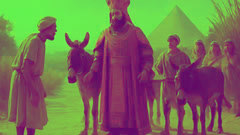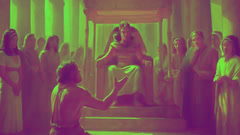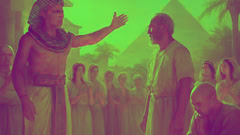Introduction
Along the fertile banks of the Nile, in the age when Egypt’s golden sands embraced the world’s mightiest river, villages clustered beneath the watchful eyes of date palms and gods. The air shimmered with heat and the promise of grain, for the Nile’s flood had retreated, leaving black earth eager for the plow. This was a land of ancient rituals and grand monuments, where the humblest farmer tilled his plot beneath the gaze of falcon-headed Horus and the ever-present sun. Yet even in this land of order—where maat, the sacred principle of justice and truth, was supposed to reign—greed and injustice sometimes crept like a shadow across the fields. Our tale begins in such a time, when the weight of a corrupt official’s greed would test the balance of maat itself, and a single peasant’s voice would echo through the marble halls of power.
In the modest village of Per-Neb near the marshy delta, Khunanup lived with his wife and children. He was neither rich nor powerful, but he was known among his neighbors for his honesty and his way with words. Every year, he loaded his donkeys with barley, onions, and baskets of sweet dates and journeyed to the great market at Henen-Su to trade. The road to the city was long and dusty, passing through reeds, groves, and the estates of Egypt’s nobility. It was a route traveled by hope and burdened by the threat of officials who lurked like crocodiles, waiting to snatch what they could from those with little.
One morning, as the sun’s first light shimmered on the water, Khunanup set out. His wife packed dates and water for his journey, blessing him with a kiss and a prayer for fair dealings. He had worked hard for his family, and though his tunic was worn, his spirit was unbowed. Along the road, he rehearsed the prices he’d ask and the stories he’d tell to entice city traders. But fate, as ever, had plans to test the soul and sharpen the tongue of those who would challenge it. As he neared the estate of the powerful steward Nemtynakht, the air grew still and heavy. It was here, at the crossroads of hunger and ambition, that the peasant’s life—and the very meaning of justice in Egypt—would be put to the trial.
The Crooked Path: Khunanup’s Encounter with Injustice
Khunanup’s journey began with hope. The air was fresh, and birds darted among papyrus stands while frogs sang from the banks. He passed fellow travelers—a potter with clay jugs, a weaver with baskets of dyed reeds, children herding goats. Each greeted him with a nod or a few words, for these were the toilers of Egypt who shared the daily struggle against sun and hunger.

As the city’s whitewashed walls shimmered in the distance, Khunanup came upon a narrow causeway flanked by reeds, marking the estate of Nemtynakht. The land here was rich—acres of waving barley and bright blue flax, all belonging to the steward, whose power radiated from the columns of his mansion like heat from a kiln. Nemtynakht, once a mere servant, had risen through cunning and the favor of higher officials. Now he lorded over those who passed his lands, extracting tolls or inventing pretexts to seize goods.
Khunanup’s heart was wary as he led his donkeys onto the causeway. Suddenly, Nemtynakht himself appeared, robes gleaming, eyes sharp. Flanked by two servants, he blocked the path, his posture as rigid as the statues in the temples. “What have you there, peasant?” he demanded, pretending surprise. “Barley, onions, dates—all for trade? You must pay the toll.”
Khunanup bowed politely. “Great lord, this is but the public road. I have always passed this way to market.”
Nemtynakht’s lips curled into a smile with no warmth. “The law is what I say it is here. If you wish to pass, you must pay—or leave your donkeys.”
Khunanup’s voice trembled but did not falter. “My lord, have mercy. I have children to feed. Let me pass, and I shall return with fair offerings.”
But Nemtynakht gave a signal. His servants yanked the donkeys’ leads, and in the commotion, one of the baskets toppled, scattering onions and barley onto the ground. “Careless fool! See how you litter my estate!” Nemtynakht shouted. With a gesture, he seized both donkeys and the load, declaring them forfeit.
Khunanup’s cries echoed across the fields. Neighbors watched in silent sympathy but dared not intervene. He pleaded with Nemtynakht, reminding him of maat, the law of the gods and the land. But Nemtynakht waved him away like a buzzing fly. “Go to the officials if you wish,” he sneered. “But remember, they dine at my table.”
Shattered but not defeated, Khunanup walked the long road to Henen-Su on foot. His feet bled, but his anger grew with every step. He knew that the city held not just markets but also the halls of justice, where scribes and judges weighed complaints. If maat lived anywhere, it must be in those hallowed chambers. Gathering his courage and his gift for words, Khunanup resolved to make his case. He would address not just a judge, but if he must, even the Pharaoh himself. For in Egypt, it was said, even the lowliest voice could be heard if it spoke with the fire of truth.
Words Against Power: The Peasant’s Plea Before the Great House
Khunanup arrived in Henen-Su with dust on his feet and hope in his chest. The city thrummed with traders, scribes, and priests, its avenues lined with sycamores and its markets brimming with the scents of incense and roasting fish. Yet Khunanup did not tarry; he pressed through crowds toward the courthouse—an airy hall of columns where justice was meant to be dispensed.

Inside, scribes sat behind low tables, their palettes and reed pens poised above papyrus scrolls. The air buzzed with disputes: a brickmaker whose house had been damaged by flood, a baker accused of cheating on weights, an old woman claiming her neighbor’s goat had trampled her melons. Khunanup waited, heart thumping, until a scribe called his name. His voice rang with urgency as he recounted Nemtynakht’s crime. “My lord scribe, I have been wronged by the steward Nemtynakht, who has seized my goods and beasts without cause. I ask only for the maat that is owed to all.”
The scribe listened but seemed distracted, glancing often at a gold signet ring—perhaps a gift from a powerful patron. “Take your grievance to Meruitensi,” he said, naming the high steward and chief judge. “But be warned: Nemtynakht is a man of influence.”
Undeterred, Khunanup followed a procession of litigants to Meruitensi’s court. The judge was a man of grave demeanor, his head shaved smooth and his linen spotless. He listened in silence as Khunanup poured out his soul. The peasant’s words unfurled with the grace of Nile reeds in the breeze: “Great lord, I am but a poor man who has been trampled by the powerful. If justice means anything in Egypt, let it not bend to gold or birth. The gods watch all; their scales weigh every heart.”
Meruitensi regarded Khunanup thoughtfully. The eloquence of the peasant stirred something within him. But still, protocol and fear of Nemtynakht’s reach stayed his hand. “Your case is not simple,” he said at last. “I will bring it before Pharaoh Rensi himself.”
Days turned into weeks as Khunanup waited, living on crusts and sleeping beneath date palms along the city walls. Each day he returned to the court, repeating his plea in words that grew sharper, richer, more impassioned. On the fifth day, Meruitensi summoned him again. “The Pharaoh will hear you, peasant. Speak now as if your words were arrows, for they may be your only shield.”
Khunanup entered the great hall of Pharaoh Rensi. The columns soared like palm trunks, sunlight streaming in shafts of gold onto painted walls. Courtiers and officials filled the chamber, their faces veiled in boredom or intrigue. At the far end, beneath a canopy embroidered with hawks and lotuses, sat Pharaoh—a man whose face bore both the weight of gods and the cares of men.
Kneeling, Khunanup raised his voice: “O Pharaoh, living god on earth, I am but a speck before you, yet maat itself calls me to speak. Should not justice shine on all? Must the weak always bow before the strong? If Egypt is to flourish, let truth be the staff that guides your hand. My words are not against a man, but for the soul of our land.”
The court fell silent. Rensi, moved by the peasant’s courage and eloquence, bade him continue. Khunanup spoke of maat and injustice, of bread stolen from the hungry, of children who learn fear instead of trust. His voice rang with a beauty that stirred even the haughtiest scribe. At last, Pharaoh spoke: “Your words are arrows and honey both, Khunanup. Justice will be done.”
The Triumph of Maat: Justice Restored and the Peasant’s Legacy
Pharaoh Rensi was not a ruler given to hasty judgment. He understood that justice must not only be done but be seen to be done. After Khunanup’s speech, he called his advisors to confer in private. The hall buzzed with speculation: some saw danger in crossing Nemtynakht, others admired the peasant’s nerve. But Rensi saw beyond politics; he saw in Khunanup’s words a mirror of Egypt’s soul.

Nemtynakht was summoned to answer for his deeds. In the glare of the royal court, stripped of his servants and his power, he stammered denials and invoked tradition. But witnesses—emboldened by Khunanup’s bravery—came forward. Villagers spoke of tolls demanded, of produce seized without cause. Even a scribe recounted seeing Nemtynakht’s men weighing baskets on false scales. Pharaoh listened to every voice.
At last, Rensi pronounced judgment. “Nemtynakht, you have trampled maat beneath your feet and brought shame to your office. Your lands and titles are forfeit. Let them be given to those you wronged.” The steward collapsed to his knees, but mercy was not his to claim. Justice, in Egypt, was maat—a balance that must be restored, not an opinion to be swayed.
Khunanup was summoned once more. Instead of kneeling, Pharaoh bade him stand as an equal. “Your words have restored the balance of maat,” Rensi declared. “You have shown that even the smallest voice may right the scales.” The court erupted in applause.
As a reward, Khunanup’s goods and donkeys were returned with interest. He was also granted a plot of land near the royal city, where he and his family would never want for bread or shelter again. But even greater was the legacy his story left: his speeches were recorded by royal scribes, studied by scholars and future judges as examples of the power of eloquence and the sacredness of justice.
Khunanup returned home a hero. His wife embraced him with tears; neighbors gathered to hear his tale. No longer just a farmer, he became a symbol—proof that Egypt’s greatness lay not in stone monuments alone but in the courage to speak truth to power. For generations, children recited his speeches and elders invoked his name when disputes arose.
And so maat was restored—not by armies or edicts, but by a peasant’s voice rising above fear. The tale spread along the Nile, weaving into the fabric of Egypt’s legends and reminding all who heard it that justice must always begin with the courage to speak, even when one stands alone before the mighty.
Conclusion
So ends the tale of Khunanup, the Eloquent Peasant, whose courage and eloquence reminded Egypt’s rulers—and its people—that maat cannot be bought or bullied. His journey from fields to palace echoed down generations as a testament to the enduring power of truth spoken from the heart. In every village along the Nile, the story was retold beside cooking fires and under starlit skies, inspiring those who listened to believe that justice, though sometimes delayed, could still be claimed by those who refused to be silent. The legacy of Khunanup shaped not only the laws of his time but also the conscience of a civilization that prized balance above all things. And in every age since, whenever justice is threatened by power or gold, his spirit walks beside those who dare to raise their voices for what is right.













